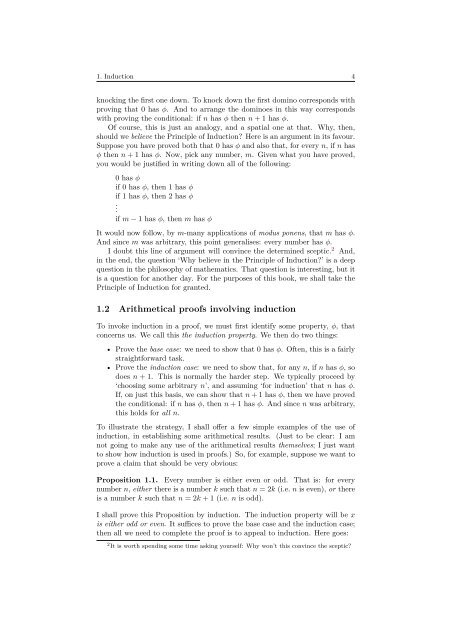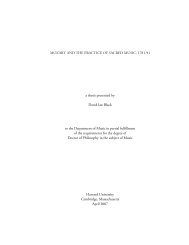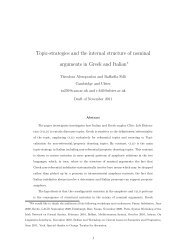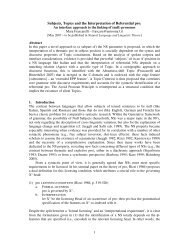Metatheory - University of Cambridge
Metatheory - University of Cambridge
Metatheory - University of Cambridge
You also want an ePaper? Increase the reach of your titles
YUMPU automatically turns print PDFs into web optimized ePapers that Google loves.
1. Induction 4<br />
knocking the first one down. To knock down the first domino corresponds with<br />
proving that 0 has ϕ. And to arrange the dominoes in this way corresponds<br />
with proving the conditional: if n has ϕ then n + 1 has ϕ.<br />
Of course, this is just an analogy, and a spatial one at that. Why, then,<br />
should we believe the Principle <strong>of</strong> Induction? Here is an argument in its favour.<br />
Suppose you have proved both that 0 has ϕ and also that, for every n, if n has<br />
ϕ then n + 1 has ϕ. Now, pick any number, m. Given what you have proved,<br />
you would be justified in writing down all <strong>of</strong> the following:<br />
0 has ϕ<br />
if 0 has ϕ, then 1 has ϕ<br />
if 1 has ϕ, then 2 has ϕ<br />
.<br />
if m − 1 has ϕ, then m has ϕ<br />
It would now follow, by m-many applications <strong>of</strong> modus ponens, that m has ϕ.<br />
And since m was arbitrary, this point generalises: every number has ϕ.<br />
I doubt this line <strong>of</strong> argument will convince the determined sceptic. 2 And,<br />
in the end, the question ‘Why believe in the Principle <strong>of</strong> Induction?’ is a deep<br />
question in the philosophy <strong>of</strong> mathematics. That question is interesting, but it<br />
is a question for another day. For the purposes <strong>of</strong> this book, we shall take the<br />
Principle <strong>of</strong> Induction for granted.<br />
1.2 Arithmetical pro<strong>of</strong>s involving induction<br />
To invoke induction in a pro<strong>of</strong>, we must first identify some property, ϕ, that<br />
concerns us. We call this the induction property. We then do two things:<br />
• Prove the base case: we need to show that 0 has ϕ. Often, this is a fairly<br />
straightforward task.<br />
• Prove the induction case: we need to show that, for any n, if n has ϕ, so<br />
does n + 1. This is normally the harder step. We typically proceed by<br />
‘choosing some arbitrary n’, and assuming ‘for induction’ that n has ϕ.<br />
If, on just this basis, we can show that n + 1 has ϕ, then we have proved<br />
the conditional: if n has ϕ, then n + 1 has ϕ. And since n was arbitrary,<br />
this holds for all n.<br />
To illustrate the strategy, I shall <strong>of</strong>fer a few simple examples <strong>of</strong> the use <strong>of</strong><br />
induction, in establishing some arithmetical results. (Just to be clear: I am<br />
not going to make any use <strong>of</strong> the arithmetical results themselves; I just want<br />
to show how induction is used in pro<strong>of</strong>s.) So, for example, suppose we want to<br />
prove a claim that should be very obvious:<br />
Proposition 1.1. Every number is either even or odd. That is: for every<br />
number n, either there is a number k such that n = 2k (i.e. n is even), or there<br />
is a number k such that n = 2k + 1 (i.e. n is odd).<br />
I shall prove this Proposition by induction. The induction property will be x<br />
is either odd or even. It suffices to prove the base case and the induction case;<br />
then all we need to complete the pro<strong>of</strong> is to appeal to induction. Here goes:<br />
2 It is worth spending some time asking yourself: Why won’t this convince the sceptic?
















